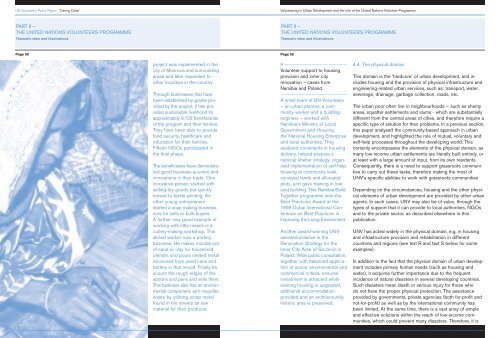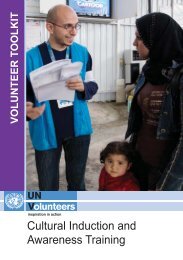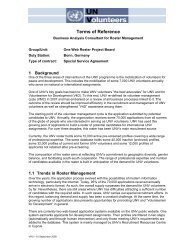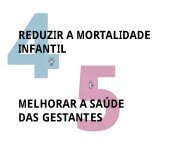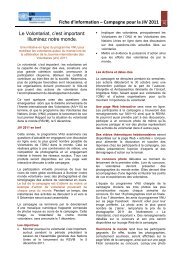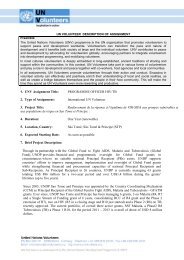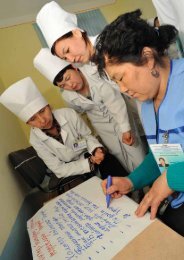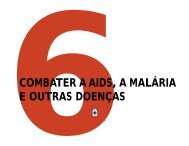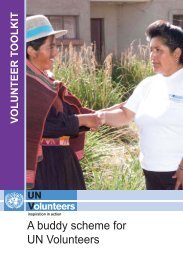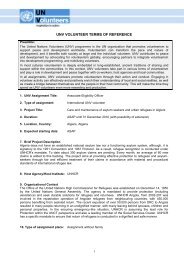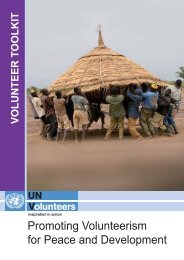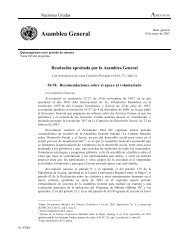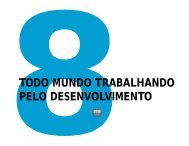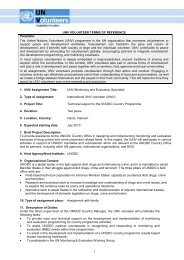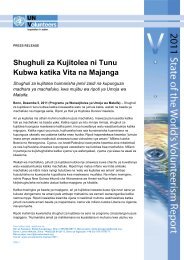View associated PDF document - United Nations Volunteers
View associated PDF document - United Nations Volunteers
View associated PDF document - United Nations Volunteers
Create successful ePaper yourself
Turn your PDF publications into a flip-book with our unique Google optimized e-Paper software.
UN <strong>Volunteers</strong> Policy Paper<br />
‘Caring Cities’<br />
Volunteering in Urban Development and the role of the <strong>United</strong> <strong>Nations</strong> Volunteer Programme<br />
PART II –<br />
THE UNITED NATIONS VOLUNTEERS PROGRAMME<br />
Thematic view and illustrations<br />
PART II –<br />
THE UNITED NATIONS VOLUNTEERS PROGRAMME<br />
Thematic view and illustrations<br />
Page 58<br />
Page 59<br />
project was implemented in the<br />
city of Monrovia and surrounding<br />
areas and later expanded to<br />
other localities in the country.<br />
Through businesses that have<br />
been established by grants provided<br />
by the project, it has provided<br />
sustainable livelihood for<br />
approximately 9,132 beneficiaries<br />
of the program and their families.<br />
They have been able to provide<br />
food security, healthcare and<br />
education for their families.<br />
Fifteen NGOs participated in<br />
the final phase.<br />
The beneficiaries have demonstrated<br />
good business acumen and<br />
innovations in their trade. One<br />
innovative person started with<br />
selling dry goods but quickly<br />
moved to textile printing. Another<br />
young entrepreneur<br />
started a soap making business,<br />
now he sells to bulk buyers.<br />
A further very good example of<br />
working with little means is a<br />
cutlery-making workshop. This<br />
skilled worker runs a pottery<br />
business. He makes moulds out<br />
of sand or clay for household<br />
utensils and pours melted metal<br />
recovered from used cans and<br />
bottles in that mould. Finally he<br />
scours the rough edges of the<br />
spoons and pans and sells them.<br />
This business also has an environmental<br />
component, as it recycles<br />
waste by utilizing scrap metal<br />
found in the streets as raw<br />
material for their products.<br />
R --------------------------------------------<br />
Volunteer support to housing<br />
provision and inner city<br />
renovation – cases from<br />
Namibia and Poland<br />
-----------------------------------------------<br />
A small team of UN <strong>Volunteers</strong><br />
– an urban planner, a community<br />
worker and a building<br />
engineer – worked with<br />
Namibia’s Ministry of Local<br />
Government and Housing,<br />
the National Housing Enterprise<br />
and local authorities. They<br />
analysed constraints in housing<br />
delivery, helped prepare a<br />
national shelter strategy, organised<br />
implementation of self-help<br />
housing at community level,<br />
surveyed lands and allocated<br />
plots, and gave training in lowcost<br />
building. This Namibia Build<br />
Together programme won the<br />
Best Practices Award at the<br />
1995 Dubai International Conference<br />
on Best Practices in<br />
Improving the Living Environment.<br />
Another award-winning UNVassisted<br />
initiative is the<br />
Renovation Strategy for the<br />
Inner City Area of Szczecin in<br />
Poland. Wide public consultation,<br />
together with balanced application<br />
of social, environmental and<br />
commercial criteria, ensures<br />
investment is attracted while<br />
existing housing is upgraded,<br />
additional accommodation<br />
provided and an architecturally<br />
historic area is preserved.<br />
4.4. The physical domain<br />
This domain is the ‘hardcore’ of urban development, and includes<br />
housing and the provision of physical infrastructure and<br />
engineering-related urban services, such as: transport, water,<br />
sewerage, drainage, garbage collection, roads, etc.<br />
The urban poor often live in neighbourhoods – such as shanty<br />
areas, squatter settlements and slums - which are substantially<br />
different from the central areas of cities, and therefore require a<br />
specific type of solution for their problems. In a previous section,<br />
this paper analysed the community-based approach in urban<br />
development, and highlighted the role of mutual, voluntary and<br />
self-help processes throughout the developing world. This<br />
certainly encompasses the elements of the physical domain, as<br />
many low-income urban settlements are literally built entirely, or<br />
at least with a large amount of input, from its own residents.<br />
Consequently, there is a need to support grassroots communities<br />
to carry out these tasks, therefore making the most of<br />
UNV’s specific abilities to work with grassroots communities<br />
Depending on the circumstances, housing and the other physical<br />
elements of urban development are provided by other urban<br />
agents. In such cases, UNV may also be of value, through the<br />
types of support that it can provide to local authorities, NGOs<br />
and to the private sector, as described elsewhere in this<br />
publication.<br />
UNV has acted widely in the physical domain, e.g. in housing<br />
and infrastructure provision and rehabilitation in different<br />
countries and regions (see text R and text S below for some<br />
examples).<br />
In addition to the fact that the physical domain of urban development<br />
includes primary human needs (such as housing and<br />
water), it acquires further importance due to the frequent<br />
incidence of natural disasters in several developing countries.<br />
Such disasters mean death or serious injury for those who<br />
do not have the proper physical protection. The assistance<br />
provided by governments, private agencies (both for-profit and<br />
not-for-profit) as well as by the international community has<br />
been limited. At the same time, there is a vast array of simple<br />
and effective solutions within the reach of low-income communities,<br />
which could prevent many disasters. Therefore, it is


